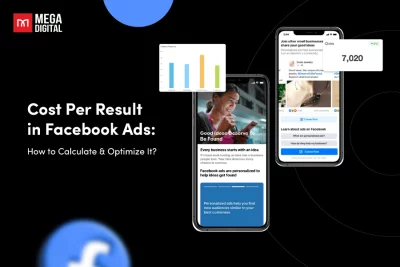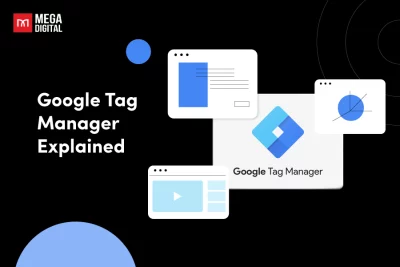Every Google Ads keyword match types has a unique function that can help you optimize your ad’s relevance and visibility. This article focuses on the features of keyword match types for Google Ads. Mega Digital will help you gain a deeper understanding—whether you are a professional looking to improve your strategy or a newbie just wanting to learn the basics.
Table of Contents
What are keyword match types in Google Ads?
Keywords are words or phrases that are used to match advertisements to the terms people search for. For example, you may use a broad match to target a broader range of user searches, or an exact match to target specific user queries.
Google Ads keyword match types are crucial as they determine when your ads appear based on user search queries. There are 3 main types: Broad Match, Phrase Match, and Exact Match.
- Broad match: Targets searches related to your keyword, reaching many people but might be less relevant due to including various related terms.
- Phrase match: Shows ads for searches containing the essence of your keyword, balancing reach and relevance by focusing on specific phrases or variations.
- Exact match: Displays ads only for searches precisely matching your keyword, ensuring high relevance but potentially reaching a smaller audience.
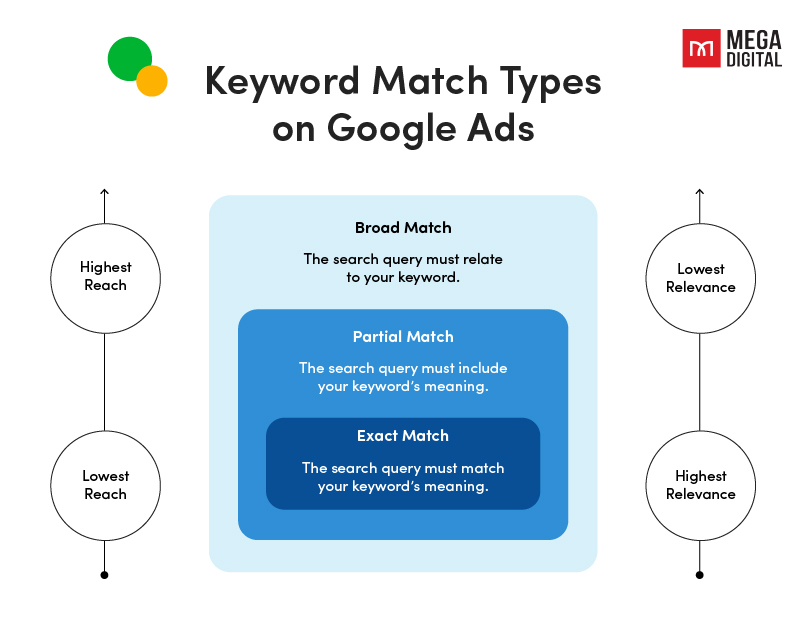
How do keyword match types in Google Ads impact Search ads results?
Google keyword match types can have a significant impact on the performance of your ad account because they are the control you use to choose which search queries you are bidding on. The following is how they affect the results.
Ad relevance
Match types affect the degree to which a user’s search query must coincide with the terms you have selected. Your ads are more likely to be extremely relevant to the searcher’s query when you use more precise match types, such as Exact Match, which could lead to higher click-through rates and conversions.
Reach
The range of matches your ads can reach varies depending on the match type. Broad Match may increase visibility by displaying your ads for a wider range of similar searches, but it may also draw less relevant traffic. Phrase Match targets particular phrases or variations, which helps to somewhat reduce the reach. The most restricted reach is provided by Exact Match, which focuses on incredibly accurate keyword matches.
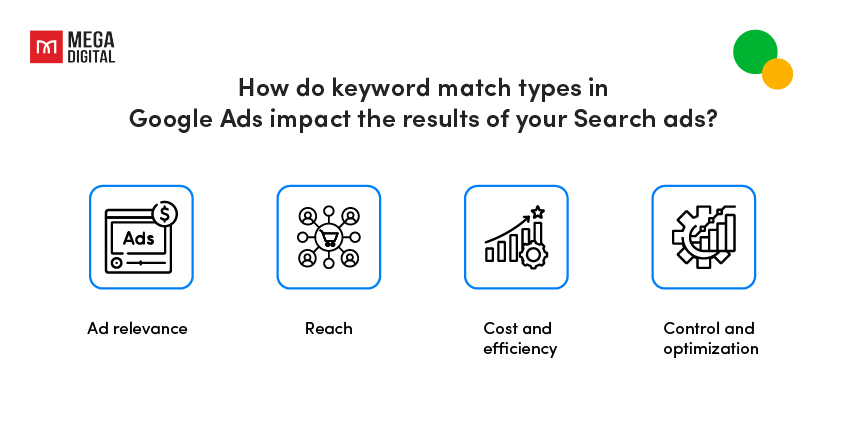
Cost and efficiency
The match type you select can have an impact on the efficiency and expense of your campaign. Broad Match may result in more clicks, but it may also result in more spending owing to less focused traffic. While Exact Match may result in fewer clicks, it often results in higher conversion rates, hence optimizing your money more effectively.
Control and optimization
Using a combination of match types gives you more control over your ads targeting. You can allocate funding and alter bids based on the performance of each match type to optimize for the best outcomes.
Overall, the Google Ads keyword match types you select have a direct impact on the quality of traffic, cost-effectiveness, and control over your Google Ads campaigns, influencing the overall success and outcomes of your advertising efforts.
3 Keyword match types in Google Ads
Google Ads provides 3 fundamental types of keyword matches that significantly impact ad targeting and visibility. Let’s dive into the details of each Google Ads keyword match type in the section below.
1. Broad Match type
The broad match type is widely used and reaches a larger audience. When you opt for broad match, your ads have the potential to show up whenever someone’s search contains any word from your chosen keyphrase, regardless of the order. Additionally, it covers related terms chosen by Google’s AI. This method ensures your ads are visible for various relevant terms, providing extensive exposure across different search queries.
Here are some of the relevant signals taken into account by broad match:
- Additional keywords in your ads group
- Previous searches made by user
- User’s current location
- Content of your landing page
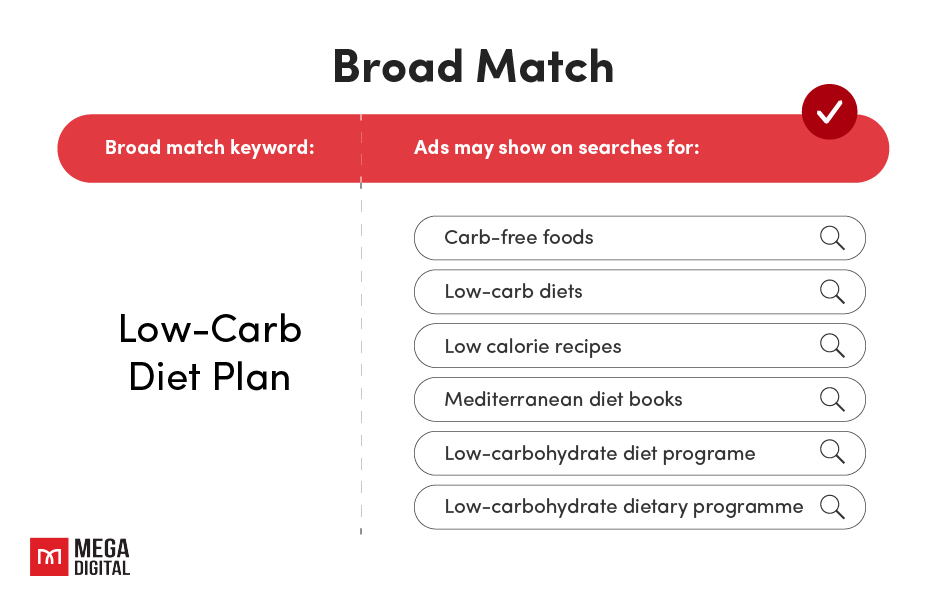
Because broad match is the default Google Ads keyword match type, extreme caution is necessary. Broad match keywords are an excellent way to get a large number of hits, but advertisers must keep an eye on their search query statistics to ensure that they are not paying for irrelevant traffic that does not convert.
You can use negative keywords to keep your ads from appearing in searches that aren’t relevant to your company. For more information on negative keywords, Mega Digital suggested some valuable insight related to this topic.
2. Phrase Match type
Phrase match type is a targeting option in Google Ads that focuses on specific phrases. This keyword match type provides a balance between reach and relevance. In Google Ads, use quote marks to indicate phrase match keywords. Ads may appear on searches that involve the meaning of your keyword. The keyword’s meaning can be implied, and user searches can represent a more specific form of the keyword’s meaning.
With phrase match, you can reach more searches than exact match and fewer searches than broad match by only showing your ads on searches that mention your product or service.
The syntax for phrase match is to add quotes around your keyword, such as “tennis shoes”. Here’s an example of how phrase match works:
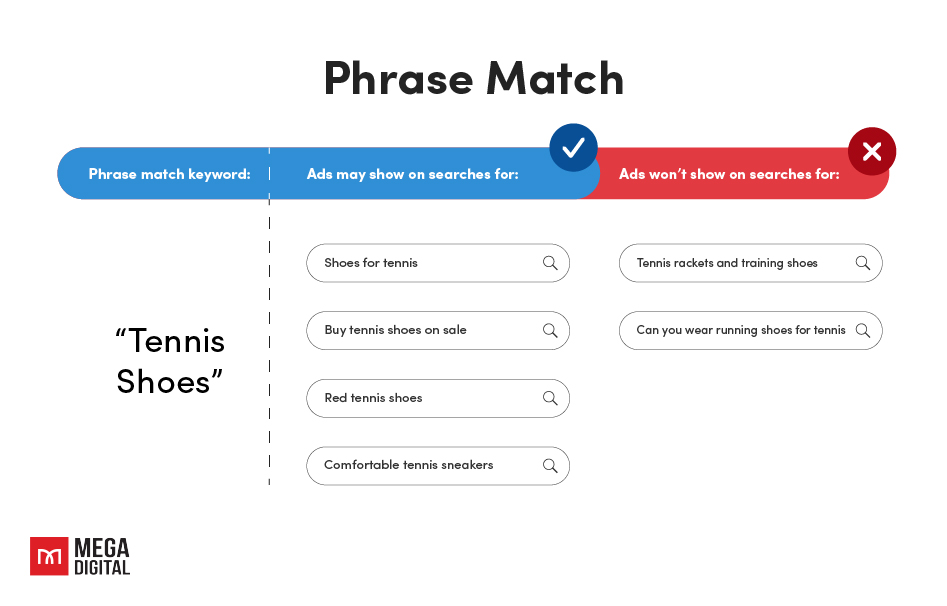
3. Exact match type
The exact match type is a targeted method within Google Ads that displays your ads solely when a user’s search query precisely matches or closely resembles your specified keyword. Previously, if your keyword were “black cocktail dress”, your ad would exclusively appear for searches precisely matching that phrase, like “black cocktail dress” typed exactly in that order. It wouldn’t trigger for variations like “cocktail dress”, “black dress”, or “expensive black cocktail dress”.
But recently, Google modified Exact Match. Now, even with Exact Match keywords, your ads might be shown for searches including synonyms, plurals, or similar variations on your keyword. This change allows for a broader range of search triggers while maintaining a higher level of precision than broader match types. If you would like your advertising to appear for a certain keyword, use the exact match. The great precision ensures perfect targeting and thus a high possibility of conversion.
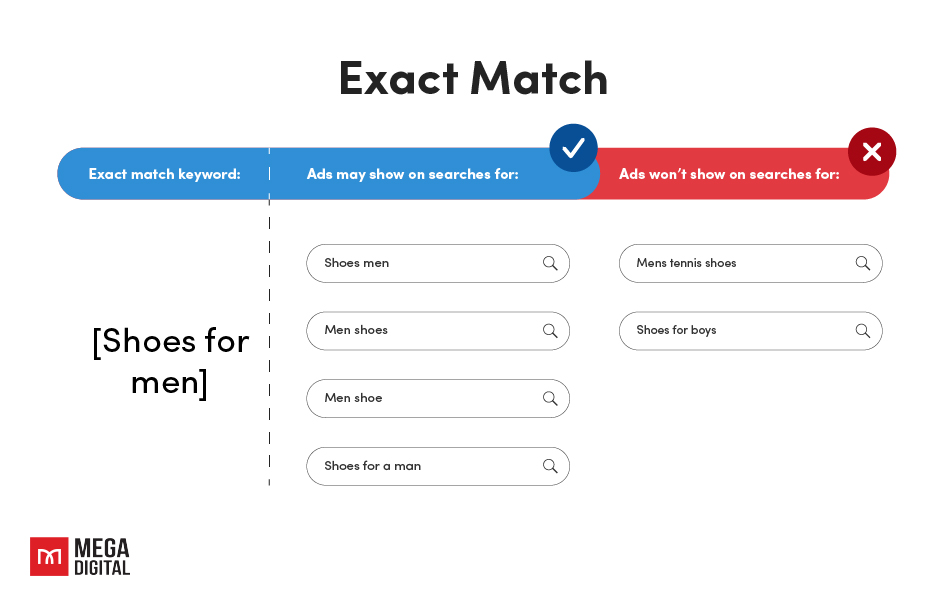
How to target keywords in Google Ads
Here is the fundamental instruction for you to set up Google Ads keyword match types.
Step 1: Log in
Log in to your Google Ads account. Then, establish either a fresh Search campaign or generate a new Ad Group within a current campaign.
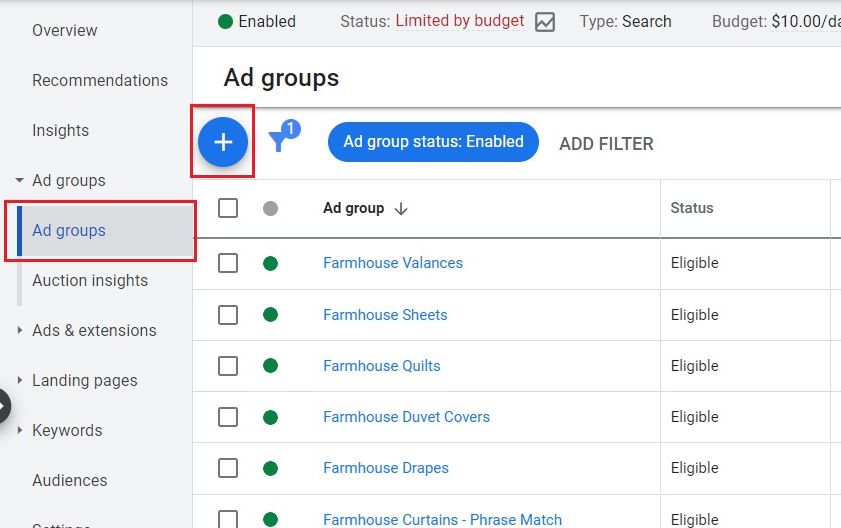
Step 2: Employ match type
Decide on the keywords that you wish to target. However, it’s recommended to employ just one keyword match type per Ad Group and refrain from targeting the same keyword using different match types.
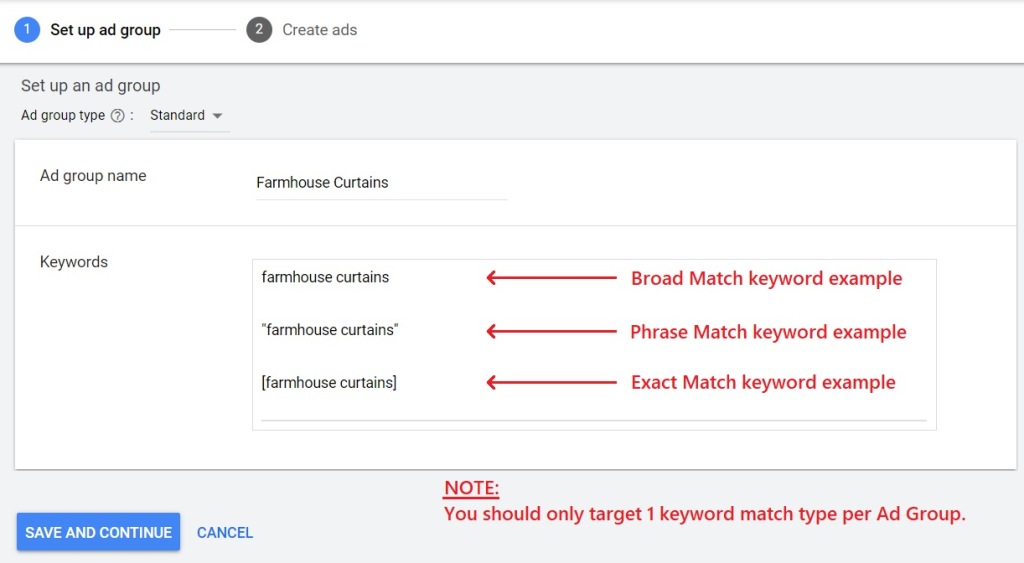
Step 3: Preview and save
Press the ‘Save And Continue’ button to set the targeting for the chosen keywords.
How do Google Ads 3 types of keyword matches differ?
Understanding the different Google Ads keyword match types is essential for any successful Google Ads campaign, whether you’re starting from scratch or looking to improve the effectiveness of an existing campaign. You can choose how broad or exacting your keywords are when matching search queries and showing adverts, with each match type providing varying flexibility.
3 types of keyword matches comparison
Absolutely, here’s a detailed table comparing Google Ads keyword match types:
| Feature | Broad Match | Phrase Match | Exact Match |
|---|---|---|---|
| Function | Casts a wide net, showing ads for related searches including synonyms, misspellings, variations, and relevant searches | Targets specific phrases, displaying ads when a user’s search includes the exact phrase or close variations, allowing additional words before or after | Displays ads exclusively when a user’s search query precisely matches or closely resembles your specified keyword, without additional words |
| Example | Keyword: “shoes” Triggered by: “buy sneakers”, “footwear deals” | Keyword: “blue shoes” Triggered by: “buy blue sports shoes”, “affordable blue shoes” | Keyword: [blue shoes] Triggered by: “blue shoes”, “shoes in blue” |
| Scope | Broad, inclusive of synonyms and related terms | Moderately specific, focus on the specified phrase and variations | Highly specific, requires exact or very close matches |
| Reach | High reach, covers diverse search queries | Moderate reach, captures more specific queries | Low reach, targets a very specific audience |
| Precision | Low precision, may include irrelevant searches | Moderate precision, balances reach and relevance | High precision, ensures relevance but limits reach |
The ultimate question is: Which Google Ads keyword match type is better? Choosing between these categories might be a tough decision. They all have both advantages and disadvantages.
- Broad match offers the greatest possible reach while being the least restrictive in terms of matching your target keyword.
- Exact match has the lowest possible reach, it also provides the closest, most relevant matching to your target keyword.
- Phrase match is in the middle, broadens your target’s reach, resulting in more clicks and conversions.
So, instead of limiting your account to one match type, why not combine them for your ads? This may require a few changes to your account structure, but it will provide you with the best balance and performance. You’ll strike a balance between having optimal reach and a narrow target, into which you can put more money to drive conversions.
Google Ads keyword match types example
Here are examples demonstrating how various search terms align with different keyword match types. These examples are derived from an active Google Ads campaign to illustrate the distinctions between broad, phrase, and exact keywords.
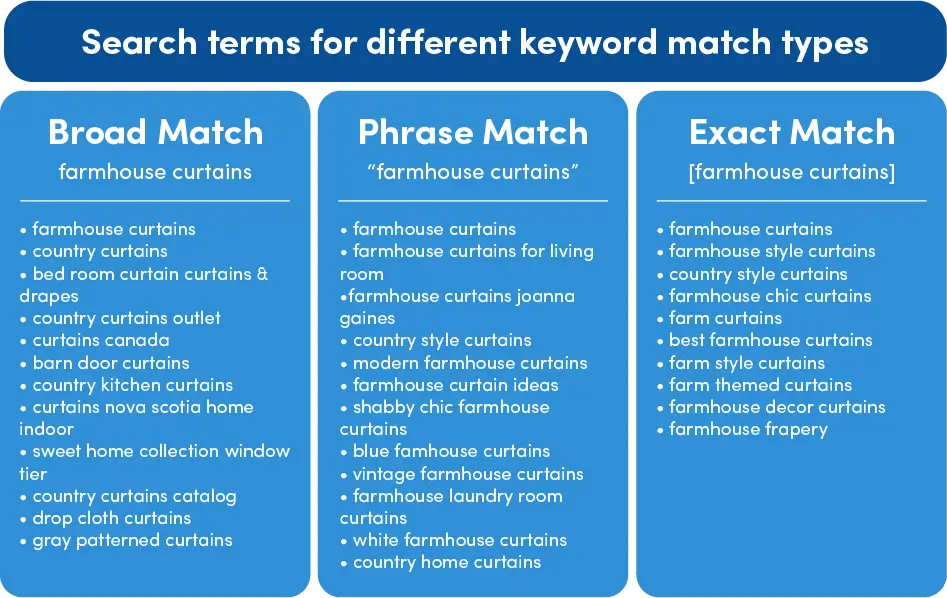
Wrap up
We trust that our guide has provided a clear explanation of exact phrase keyword match types for you. Understanding Google Ads keyword match types is crucial for targeting the right audience. When it comes to match kinds, remember that there is no right or wrong answer. Every business purpose and budget is unique and must be considered while deciding on the appropriate method.
If you need more information about other keyword match types and Google Advertising in general, visit our blog website to satisfy your demands.





